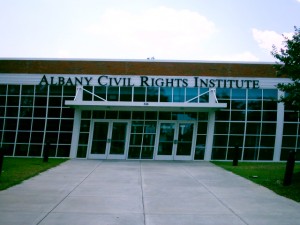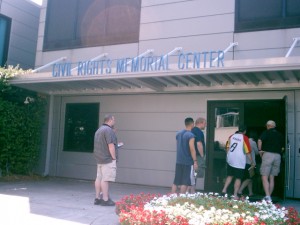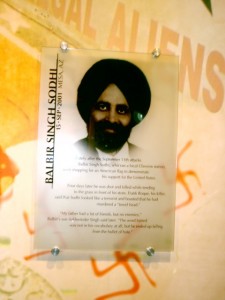Songs of Survival, Hope, & Resistance
Our journey today started off with a memorable visit the Albany Civil Rights Institute in Albany (GA). On the way we heard songs sung by the Rutha Harris of the Albany Freedom Singers which were inspirational. Music was critical not just to the activists of the civil rights movement; it had always served as a vehicle by which African Americans recorded and remembered their past, their struggles, and hopes for the future. These were songs of survival, hope and resistance. As Rutha Harris, one of the Albany Freedom Singers told us, “The music kept us going, kept us from being afraid.” During the civil rights movement freedom songs raised the social conscience of blacks and were made up of songs from the slave era, spirituals of the black churches of the South. The lyrics of one song ran “Aint gonna let nobody turn me around….I’m gonna keep on walking, keep on talking…marching onto freedom land.”
This music and perhaps many sermons of the time were about freedom, overcoming distress,
A movie on Rosa Parks kept us engaged as we traveled to our next stop—Montgomery Alabama.
Perhaps one of the most memorable things that I read about today was the story of Kay Smith Pedrotti and Gloria Ward. Both stood on opposite sides of the civil rights movement, the former being white and the latter black. Pedrotti supported segregation while Ward championed full integration of African Americans in everyday life. 35 years later, in 1998 Pedrotti and Ward finally met and reconciled with Pedrotti saying that “It took 35 years to find Gloria—and forgiveness of my racist past” (cited on a poster in the Old Zion Baptist Church, Albany, GA).
Later in the day we visited the Southern Poverty Law Center in Montgomery, Alabama. This nonprofit civil rights organization was founded in 1971 by civil rights lawyers Morris Dees and Joseph Levin Jr. The SPLC is internationally known for tracking and exposing the activities of numerous hate groups most famously the United Klans of America in 1981. Its activities resulted in the United Klans of America going bankrupt. Our group also learned about Viola Liuzzo a white married mother of five and civil rights activist who lived in Minnesota. In the early 1960s she saw what was happening in Alabama and left her family and traveled alone to Alabama in her car and helped out in the civil rights movement, joyfully ferrying activists from place to place. Her activities came to a tragic end when she was hunted down by KKK activists and brutally murdered in 1965. I was told that the then FBI Director J. Edgar Hoover planted misinformation on her to question her integrity a perception that many believed in, including her children, and it was only in the last 10 years that they came to learn the truth about their mother. Viola Liuzzo’s story has been portrayed in a documentary called Home of the Brave. What amazed most of us in the group was the continued persistence of racist and hate groups which have apparently proliferated after the election of the current President Barack Obama. The SPLC’s continues to vigorously pursue such groups by taking them to court.
Outside the building is a simple yet powerful memorial to 40 civil rights activists who gave their lives in the pursuit of civil rights agendas. Designed by architect Maya Lin (of Vietnam Memorial fame), the circular black marble base with a fount of water at its center was built in 1989. The water flowing over the names of the activists is inspired by Martin Luther King Jr’s paraphrase of Amos 5:24 “We will not be satisfied until justice rolls down like waters and righteousness like a mighty stream.”
This heavy dose of religious faith, activism, violence, tragedy, and triumph made this third day of our tour a rather heavy one to process. I was particularly moved by the well-known case of Balbir Singh Sodhi, a Sikh from India, who was gunned down in the wake of 911 because his assailant wanted to “kill a Muslim.” Sodhi’s death reminded me of the worry experienced by members of my own family, living in New York, in the wake of 911. Was Sodhi a victim of 911? Apparently, the state of Arizona did not think so and for some time toyed with the idea of removing his name from a memorial for victims of 911. In May 2011 the state backed down in deference to the wishes of the Sodhi family and thousands of individuals who had petitioned on their behalf. That is where the matter rests, for now. More details are available at http://www.saldef.org/news/victory-arizona-governor-vetoes-anti-sodhi-memorial-bill/
Tomorrow will be another day.



Thank you for visiting the CIvil Rights Memorial Center. Your presence, and deep interest in the subject matter, enriched my life.
Lecia
SPLC Outreach Director
This will be a fantastic blog, would you be involved in doing an interview about how you developed it? If so e-mail me!
Dear Edmond,
Thank you for your comment. I will be happy to do an interview. But, could you tell me a little more about the nature of the interview and the publication it will appear in.
With every good wish.
Bernardo